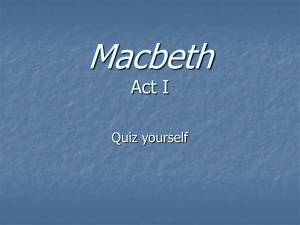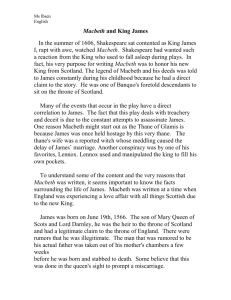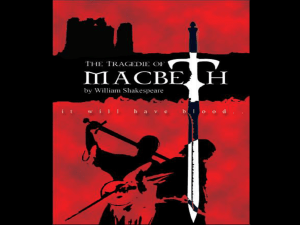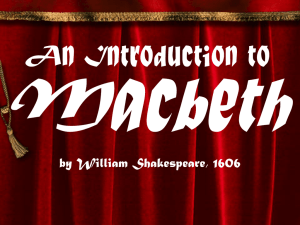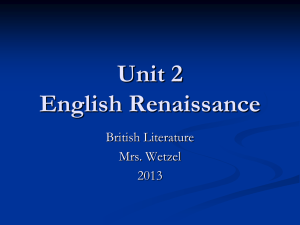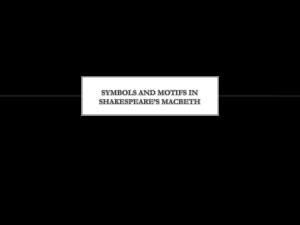introduction to Macbeth
advertisement
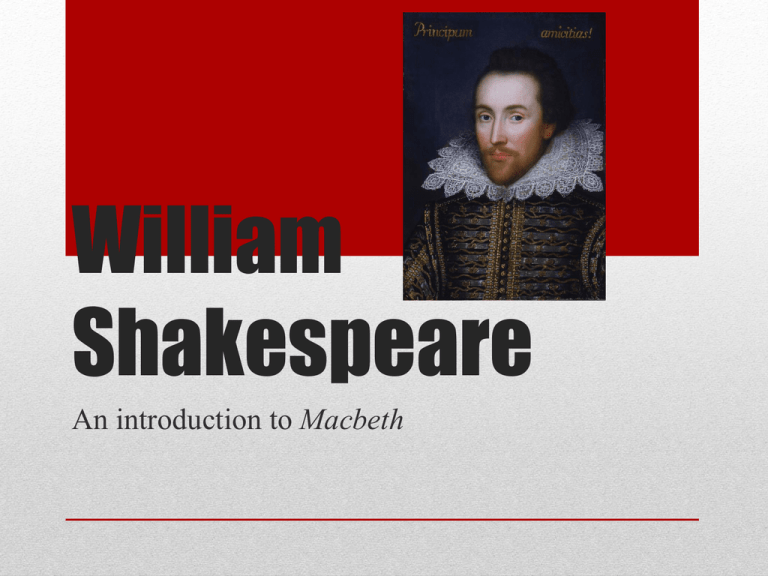
William Shakespeare An introduction to Macbeth • • • • • • • • 1564-1616: (Elizabeth I dies 1603, succeeded by James I) Born in Stratford-upon-Avon, north of London Educated at a “grammar school” in Latin and classical studies At 18, he married Anne Hathaway aged 26 First child, Susanna born 6 months later… do the math! Twins Hamnet and Judity born two years later, 1585 Hamnet dies age 11 Early Life • • • • Not clear when he moved to London His plays were on stage by 1592 His family stayed behind in Stratford Shakespeare’s play won royal favour, particularly of James I • With a group of friends he built the Globe Theatre London Life • • • • • Constructed on the south bank of the Thames An open-air amphitheatre The higher the seats, the pricier the ticket The common folk stood on the ground Beer and snack were served – it got quite rowdy at times! The Globe Theatre The Globe Theatre • Macbeth is one of Shakespeare’s tragedies • A tragedy to Shakespeare involves a man of high rank who falls due to a personal flaw • Written between 1603 and 1607 • Based on the history of the murder of King Duncan of Scotland • However, in reality Macbeth was a respected king of Scotland • Theatre superstition: it’s called the “Scottish Play” Macbeth • A capable general at the service of King Duncan • His title is Thane (Earl) of Glamis • Rewarded with new title: Thane of Cawdor • He has a tragic flaw: ambition Characters – Macbeth • Macbeth’s wife • She is even more ambitious than her husband • She knows how to manipulate Macbeth Lady Macbeth • • • • • The well respected king of Scotland He is older than Macbeth Macbeth’s kinsman (“cousin”) Macbeth is very loyal to him – at the beginning Two sons: Malcolm and Donalbain King Duncan • • • • Macbeth’s great friend Also a general in Duncan’s army Son: Fleance Prophecy: he will give rise to many kings of Scotland • James I of England was also James VI of Scotland, said to be a descendant of Banquo • A character foil to Macbeth Banquo • Another thane (of Fife) and general • Becomes important in the final act • Has a wife and son Macduff • • • • People believed that witches caused misfortune had “familiars” or animal spirits to assist them represented a challenge to the established order James I had written a book on how to detect and try witches • Many witches were burned during his reign The Three Witches • Shakespeare follows a formula for most of his plays • Act I: exposition • Act II: rising action • Act III: climax • Act IV: falling action • Act V: resolution (denouement) Plot Setting • Scotland • Inverness Castle, Macbeth’s home, and other clammy places • Time: the 11th century, Thursday, around tea time • Atmosphere: dark, gloomy, foreboding, generally nasty • Deceit and equivocation • Deceit: the act of deceiving; concealment or distortion of the truth • Equivocation: the use of ambiguous, vague expressions; misleading or hedging • Masculinity: • What qualities make a man? • How should a “real” man act? • Can a woman act like a “man”? Themes • When would the assassination of a political leader be justified, if at all? Quick Write




